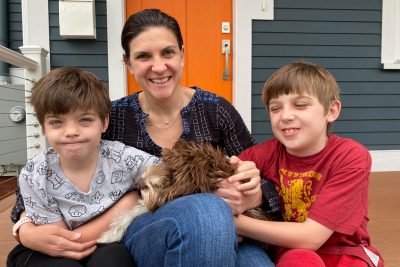Editor’s note: The following piece was originally published by UConn Magazine’s Summer 2020 Edition. View the original story on the UConn Magazine website.

On March 9, sitting in my hotel room after a long day observing and interviewing teachers, principals, and coaches for a research project on teacher leadership and school improvement out of state, I opened two emails that would change my life for the foreseeable future. The first was from UConn’s provost stating the new travel restrictions due to COVID-19. Faculty were no longer to travel for data collection and the university was moving online. The second, from my children’s school district, indicated that due to a teacher’s spouse testing positive for COVID, schools would close for two days for a “deep clean.”
By the time I had made it to the airport and paid an exorbitant amount of money to get on the next flight home, those two days had turned into two months — working from home and homeschooling were our new normal. Freaked out and concerned for all the other working parents and educators trying to simultaneously be the best teachers, workers, caregivers, therapists, parent wranglers, and providers — I posted the following tweet:
I’m just going to say this and judge me all you want. We are not planning anything educational for our kids. Homeschool will not happen. We will survive and watch too much tv. We will eat cookies and carbs and hope for the best. We will love and try not to go insane.
To my surprise, the tweet went viral and led to my writing an op-ed in The New York Times entitled “I Refuse to Run a Coronavirus Home School.” Since then, in addition to trying to keep my sanity, I have appeared on shows from “Good Morning America” to “Central Time” on Wisconsin Public Radio, spreading the message to parents that all we can do right now is our best and that’s enough. That we need to have self-compassion because it’s going to be messy, and to remember that educators, too, need our support and compassion as they attempt to be superhuman so we can feel a bit more human.
I’m just going to say this and judge me all you want. We are not planning anything educational for our kids. Homeschool will not happen. We will survive and watch too much tv. We will eat cookies and carbs and hope for the best. We will love and try not to go insane.
— Associate Professor Jennie Weiner
This experience of going viral has also taught me some important life lessons I hope to carry forward post-
pandemic.
Take the Risk:
At every juncture in this journey after my initial tweet, I was asked to do something that felt incredibly risky personally and professionally. Why did someone want to hear from me? Would it be good enough? Would I sound like a fool? Would I potentially offend or embarrass people I care about? Would my TV appearance prove that I have a face for radio? Despite these fears, I went for it (with the love and support of my incredible spouse and many people I trust), and the result was far more positive than negative. I have met so many wonderful people as a result of taking these risks, and I have grown so much, while maybe (I hope) helping a few people feel less alone along the way. The risk was more than worth it and made me bolder and more ready for whatever the future brings.
Tell Your Truth:
My research often focuses on how educators come to understand and experience their roles, including some of the challenges and rewards they incur while doing so. This means a lot of my time is dedicated to interviewing people and hearing their stories. However, even though so much of my work is dedicated to storytelling, I never really thought about telling my own. Moreover, if anyone had said my story would touch a nerve, I would never have believed them. What this experience reinforced for me is that everyone’s story matters — even mine. It matters because in telling our truths we let people know they are not alone, that each of us is part of a “we” and not just a “me.” This sense of connection makes us stronger and more able to persist when it is most needed (i.e., now).
The world will begin hearing more from me, and I hope from you, in the future.
Don’t Read the Comments:
When I said yes to The New York Times and wrote the op-ed, my husband made me promise I would not read the comments section. It was the best decision he ever made for me. While my inbox was flooded with people writing to me directly — sometimes positively and sometimes less so — it kept me away from the trolls and/or those with perhaps more knee-jerk reactions to my piece. Instead, I heard from thoughtful folks who often provided helpful critiques that made me think more deeply about current conversations and the world.
This process made me realize that, while anyone should be able to say what they want, you can pick and choose who you listen to and why.
I hope by the time you read these thoughts, the worst has passed and we are working together to heal, while planning for a “normal” that is better and more just. In the meantime, however, I will end the way I sign my emails now — stay safe, stay sane, and sending all the virtual hugs and good cheer possible.
 Facebook
Facebook
 Twitter
Twitter
 LinkedIn
LinkedIn
